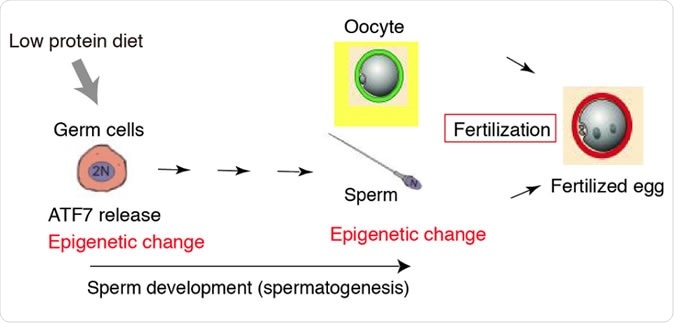It is already known that if the parents eat diets that are inadequate in protein or high in fat, they are laying the foundation for future metabolic disorders in their offspring once the latter reach adulthood. The current study in mice adds to the knowledge of the molecular mechanisms that cause this to happen.
Some scientists follow the philosophy of developmental origins of health and disease, in which factors such as parental stress and diet operating in prenatal life are the key to disease development in adult life. This has some experimental support, in that studies have shown a significant role played by environmental factors in determining the adult health of their offspring, in addition to genetic contributions. One especially important prenatal exposure is the consumption of low-protein diets by the parents, which is associated with future metabolic disorders in the children.
The way in which dietary exposure works is by epigenetic regulation. This refers to changes in the level of expression of various genes mediated by alterations in various side groups attached to the DNA molecule, without any structural change in the genes themselves. The actual working of this mechanism remained unknown and was the motivation for the current study.
The study
The current study looked at parental diet and the health of future offspring in a mouse model. The scientists fed both male and female mice with either regular mouse food or food that lacked sufficient protein. The mice were then allowed to mate, and the offspring were allowed to grow to adulthood.
The investigators then looked at the pattern of gene expression in these offspring during adult life, born to male mice who were on either regular or low-protein diets.
They also repeated the experiment using male mice with engineered genomes that lacked a single copy of a gene, encoding a transcription factor called ATF7, which is, therefore, one of the genes that determine the state of activity of a gene at any given time.
The findings
The scientists found that hundreds of genes in the liver were expressed at different levels in the two groups of adult offspring. Many of these genes regulate various steps in cholesterol metabolism in the body.
However, when only one copy of the ATF7 gene was present in the male parent, the resulting offspring showed the same pattern of gene expression, as seen in those born to normal male mice.
The scientists think that this finding suggests the impact that the diet of a male mouse parent on the health of future adult offspring. The fact that a male parent cannot cause any change in the metabolic profile of the offspring after conception means that these results are probably caused by epigenetic alterations in the DNA carried within the sperm derived from the male parent. And the absence of harmful changes in gene expression following ATF7 gene deletion means that this protein plays a vital role in this process.

Parental diet affect the epigenetic status in sperm and health of offspring. Image Credit: RIKEN
In fact, the investigators then went on to examine the genome in sperm cells for genes regulated explicitly by ATF7. This includes genes for fat metabolism and cholesterol generation within the liver cells.
The results were intriguing: in the male mice on low-protein diets, the ATF7 within the sperm cells failed to bind firmly to the genes they are supposed to regulate. As a result, there was a specific change in certain histones, which are basic proteins attached to the DNA strand to stabilize it. The histone alteration led to the 'switching on' of the genes that ATF7 failed to regulate within the sperm – which were normally supposed to be turned off.
Researcher Shunsuke Ishii at the RIKEN Cluster for Pioneering Research (CPR) points out: "The most surprising and exciting discovery was that the epigenetic change induced by paternal low protein diet is maintained in mature sperm during spermatogenesis and transmitted to the next generation."
Implications
The study in mice thus lends support to the Developmental Origins hypothesis of health and disease as well as throwing light on the types of nutritional imbalance that could cause lifestyle diseases like diabetes in the offspring. Even more, the assessment of sperm cell epigenetic changes in the genes identified in this study should make it possible to forecast the type of metabolic dysfunction that will crop up in the succeeding generation.
The researchers sum up: "We hope that people, especially those who have poor nutrition by choice, will pay more attention to their diet when planning for the next generation. Our results indicate that diets with more protein and less fat are healthier not just for everyone's own body, but also for sperm and the health of potential children."
Journal reference:
Keisuke Yoshida, Toshio Maekawa, Nhung Hong Ly, Shin-ichiro Fujita, Masafumi Muratani, Minami Ando, Yuki Katou, Hiromitsu Araki, Fumihito Miura, Katsuhiko Shirahige, Mariko Okada, Takashi Ito, Bruno Chatton, Shunsuke Ishii, ATF7-Dependent Epigenetic Changes Are Required for the Intergenerational Effect of a Paternal Low-Protein Diet, Molecular Cell, 2020, http://www.sciencedirect.com/science/article/pii/S1097276520301489